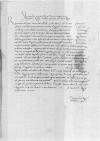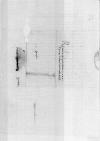cf. [Ioannes DANTISCUS] to [Sigismund I Jagiellon] Löbau (Lubawa), 1537-03-16, CIDTC IDL 1602⌊Scribitcf. [Ioannes DANTISCUS] to [Sigismund I Jagiellon] Löbau (Lubawa), 1537-03-16, CIDTC IDL 1602⌋ nobis Paternitas Vestra de communi paper damaged⌈[muni]muni paper damaged⌉ sententia consilioque Council of Royal Prussia the most important local authority in Royal Prussia. It consisted of two bishops (of Ermland (Warmia), who served as the Council’s president, and of Kulm (Chełmno)), three voivodes (of Kulm, Marienburg (Malbork), and Pomerania), three castellans (of Kulm, Elbing (Elbląg), and Gdańsk (Danzig)), three chamberlains (of Kulm, Marienburg, and Pomerania), and representatives of the three Great Prussian Cities – Gdańsk, Thorn (Toruń), and Elbing (ACHREMCZYK 2016, p. 17-18)⌊consiliariorum terrarum nostrarum PrussiaeCouncil of Royal Prussia the most important local authority in Royal Prussia. It consisted of two bishops (of Ermland (Warmia), who served as the Council’s president, and of Kulm (Chełmno)), three voivodes (of Kulm, Marienburg (Malbork), and Pomerania), three castellans (of Kulm, Elbing (Elbląg), and Gdańsk (Danzig)), three chamberlains (of Kulm, Marienburg, and Pomerania), and representatives of the three Great Prussian Cities – Gdańsk, Thorn (Toruń), and Elbing (ACHREMCZYK 2016, p. 17-18)⌋, ut Thorn (Toruń, Thorunium), city in northern Poland, on the Vistula river in its lower reaches, main residence of the bishops of Kulm (Chełmno); one of the three Great Prussian Cities (along with Gdańsk and Elbing) which had representatives in the Council of Royal Prussia; a member of the Hanseatic League⌊ThoruniiThorn (Toruń, Thorunium), city in northern Poland, on the Vistula river in its lower reaches, main residence of the bishops of Kulm (Chełmno); one of the three Great Prussian Cities (along with Gdańsk and Elbing) which had representatives in the Council of Royal Prussia; a member of the Hanseatic League⌋ potiu paper damaged⌈[potiu]potiu paper damaged⌉s quam Marienburg (Malbork), town and castle in northern Poland, Pomeranian Voivodeship, on the Nogat river, a branch of the Vistula at its delta, the capital of the Grand Masters of the Teutonic Order in Prussia (1309-1457), a voivodeship capital in Royal Prussia, which belonged to the Kingdom of Poland (1466-1772). Marienburg (taking turns with Graudenz (Grudziądz)) was the venue for the Provincial Diets of Royal Prussia, which were chaired by the bishop of Ermland (Warmia)⌊MariemburgiMarienburg (Malbork), town and castle in northern Poland, Pomeranian Voivodeship, on the Nogat river, a branch of the Vistula at its delta, the capital of the Grand Masters of the Teutonic Order in Prussia (1309-1457), a voivodeship capital in Royal Prussia, which belonged to the Kingdom of Poland (1466-1772). Marienburg (taking turns with Graudenz (Grudziądz)) was the venue for the Provincial Diets of Royal Prussia, which were chaired by the bishop of Ermland (Warmia)⌋ Provincial Diet of Royal Prussia ⌊comitiaProvincial Diet of Royal Prussia ⌋ haberi mandaremus diemque produceremus in paper damaged⌈[n]n paper damaged⌉ 1537-05-24⌊quinta paper damaged⌈[quinta]quinta paper damaged⌉m1537-05-24⌋ aut 1537-05-25⌊sextam feriam proximam1537-05-25⌋ a festo 1537-05-20⌊Pentecostes1537-05-20⌋. Alterum libenter concedimus, ut paper damaged⌈[ut]ut paper damaged⌉ Thorn (Toruń, Thorunium), city in northern Poland, on the Vistula river in its lower reaches, main residence of the bishops of Kulm (Chełmno); one of the three Great Prussian Cities (along with Gdańsk and Elbing) which had representatives in the Council of Royal Prussia; a member of the Hanseatic League⌊Thor paper damaged⌈[Thor]Thor paper damaged⌉uniiThorn (Toruń, Thorunium), city in northern Poland, on the Vistula river in its lower reaches, main residence of the bishops of Kulm (Chełmno); one of the three Great Prussian Cities (along with Gdańsk and Elbing) which had representatives in the Council of Royal Prussia; a member of the Hanseatic League⌋ Provincial Diet of Royal Prussia ⌊comitiaProvincial Diet of Royal Prussia ⌋ sint, alterum facere nobis non licet, ut tempus prorogemus, nam [...] paper damaged⌈[...][...] paper damaged⌉ e paper damaged⌈[e]e paper damaged⌉xpeditionem bellicam generalem contra hostes nostros decreverimus. Si diem aliquem lo paper damaged⌈[m lo]m lo paper damaged⌉ngiorem Provincial Diet of Royal Prussia ⌊comitiis terrarum PrussiaeProvincial Diet of Royal Prussia ⌋ praefiniremus, fieri non posset, ut qui mittendi paper damaged⌈[tendi]tendi paper damaged⌉ sunt istuc a nobis consiliarii nostri, una et comitiis istis, et pro officio suo bellique quoque expeditioni interessent. Quare necesse est omnino absolvi Provincial Diet of Royal Prussia ⌊comitia terrarum nostrarum PrussiaeProvincial Diet of Royal Prussia ⌋, priusqum facta fuerit expeditio generalis, ut nihil sit, quod consilia conatusque nostros impedire queat et retardare. Itaque scribi iam mandata curavimus ad omnes districtus et civitates, quibus edicimus, ut ad diem comitiorum per nos praefinitum praesto sint instructique et parati veniant. Ad exactores quoque tributorum dabuntur per nos mandata, ut primo quoque tempore acceptorum et expensorum rationem reddant.
De Sigismundus Grudziński ⌊Sigismundo GrudzinskiSigismundus Grudziński ⌋, subdito nostro, nihil nobis statuere licet contra commune ius omnium populoroum Poland (Kingdom of Poland, Polonia)⌊regniPoland (Kingdom of Poland, Polonia)⌋que nostri constitutiones. Non est clam Paternitatem Vestram, quod actor forum rei sequitur. Proinde nobis non licet cogere quemquam, ut iudicio pareat eorum, ad quorum iurisdictionem non pertinet. Apud eos iudices actor cum eo experiatur necesse est, quorum cognitionem declinare non possit.
Bene valeat Paternitas Vestra.


 AGAD, AZ, 2999, f. 154v
AGAD, AZ, 2999, f. 154v